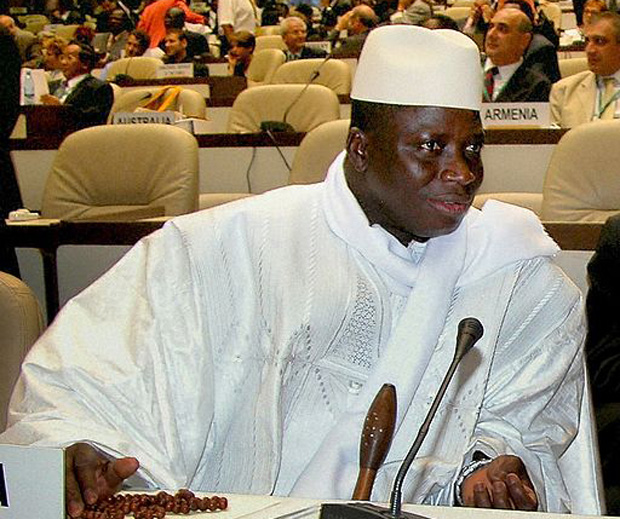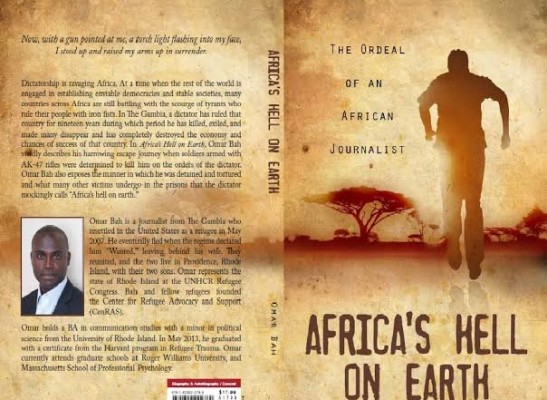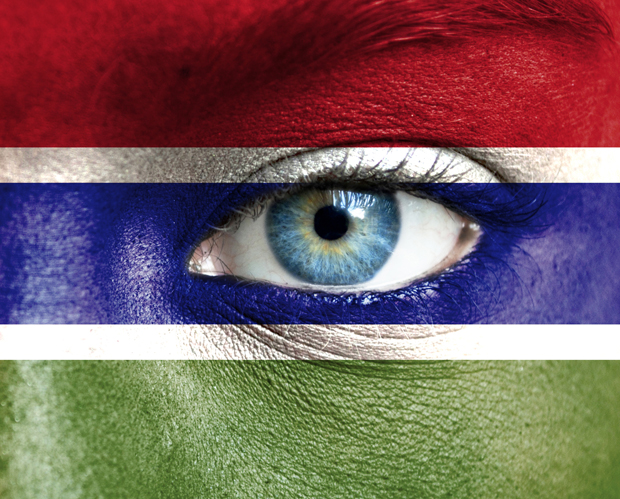28 Mar 2014 | Africa, Gambia, News and features

Yahya Jammeh (Image: IISD/Earth Negotiations Bulletin/Wikimedia Commons)
Gambia’s president Yahya Jammeh has said he will soon discontinue the use of English as his country’s official language, describing it as “colonial legacy”. The plan appears to be to make a local language the country’s official one, but reports have also emerged suggesting Arabic will replace English.
Speaking at the swearing-in ceremony of the country’s newly appointed Chief Justice, Jammeh — known for his anti-western rhetoric and policies — said for the next “one billion years”, the British have “no moral platform to talk about human rights anywhere in the world”. Gambia gained its independence from the UK 49 year ago, and the president stated that the only British remnant is the English language. “We no longer believe that for you to be a government, you should speak a foreign language; we are going to speak our own language,” he emphasised.
The move comes after Gambia withdrew its membership of the British Commonwealth in October last year, stating that it “will never be a member of any neo-colonial institution and will never be a party to any institution that represents an extension of colonialism”.
The news has been met with opposition. Former diplomat Dr Momodou Lamin Sedat Jobe, now heading the pro-democracy group Gambia Consultative Council (GCC), told news site Jollof that the president’s latest statement is “yet another disappointment”, questioning its feasibility.
“It is much easier said than done,” said Hamat Bah, leader of the oppositional National Reconciliation Party (NRP), in an interview with local newspaper the Point. He said the implications and ramifications would be huge and must be addressed before the change could be made.
Demba Ali Jawo, a journalist and prominent political analyst, suggested that President Jammeh’s announcement was just a diversionary tactic to shift focus from the economic and social problems his government faces. He points out that a change of language would take much more than just mere anti-western rhetoric, arguing that “as our languages are not yet written, we need to develop a dynamic written form which has the capacity to accommodate the rapid technological development, including information technology”. He highlighted the judicial system as a sector where the switch away from English could be particularly complicated, and predicted that it would take much longer than President Jammeh’s own lifetime for Gambia to completely do away with the use of English.
This article was posted on March 28, 2014 at indexoncensorship.org
26 Mar 2014 | Digital Freedom, Gambia, News and features

The increasingly authoritarian regime of Gambia is suspected of blocking the popular social media app Viber following weeks of speculation on the government’s intentions. The government said it has not been banned and blames service providers for the outage.
Threatened by the growing popularity of free internet phone services using voice over internet protocol (VOIP), the government of Gambia is said to believe the use of such services is helping online Gambian media in the diaspora to deliver information to the public through whistle blowers.
The regime in Banjul is also looking into the possibility of extending the block to other calling apps like Skype, according to press reports.
“The government has decided to block Viber. We cannot communicate with our love ones in the diaspora”, an insider at GAMCEL, the national cellular company, confirmed to index. The source said that a new app called Hitalk can be downloaded to get the Viber-like services.
Asked what prompted the decision “it is government order and we as mere employees we have no other option to obey instructions given to us by our bosses,” the source said.
In an interview with the Standard, a local newspaper, Lamin Camara deputy permanent secretary at the ministry of information and technology denied that government blocked the app.
Camara blamed what he described as erratic network of service providers. He said patchy service is affecting the quality of calls that subscribers can make through Viber and other social media services.
Sidi Sanneh, a former Gambian civil servant and a political activist, posted an opinion piece on this blog saying that this is not the first time the regime tried to censor the internet. Sanneh described the Gambian regime as a desperate one.
“We managed to place calls to Banjul using Viber and discovered that there are some who are indeed experienced interruption of service for the past couple of days,” he stated. Sanneh went on to say that there are a few who have already resolved the problem by simply downloading other apps to get around what appears to be a nuisance.
He advised users to download a VPN client, which allows the user to be assigned a random IP address that changes every time Viber is used.
“We were told that the persons engaged by the regime to interfere with the internet are ‘amateurs who will only succeed in damaging their servers’”, Sanneh concluded
Sam Phatey, a Gambian intelligence analyst and American Street News contributor told ASN, an online Gambian newspaper, that the decision of the Gambia government is illogical.
Phatey observed that the government feels insecure and scared because exiled dissenters are using the service to plan and communicate with Gambian.
In April last year the Gambian regime ordered the Public Utility Regulatory Authority to ban the use of phone services using VOIP, the regime also imposed stiff charges on internet cafes to register for use of VoIP.
This article was published on March 26, 2014 at indexoncensorship.org
3 Mar 2014 | Gambia, News and features

Driven into exile by the brutal regime of Gambia’s president, Yahya Jammeh, journalist Omar Bah’s dramatic flight from his homeland is recounted in his memoir Africa’s Hell on Earth: The Ordeal of an African Journalist.
An outspoken critic of the country’s autocratic ruler, Bah was forced to flee Gambia for neighbouring Senegal, where he was welcomed by other Gambian exiles who had settled in Dakar. Later, his path led him to Ghana and eventual resettlement in the US.
“I wanted to use my new found freedom in America to speak up because I regained the voice I lost. The book is my source of rejuvenation, my symbol of refusal to be silenced, and the avenue to continue to expose corruption, mismanagement, torture, repression, killings and the general dictatorship in The Gambia. I feel I owe it to the suffering people in The Gambia”, he stated.
Bah fell from grace after he was suspected of the being an informant for US-based Freedom, an online news site critical of the Jammeh regime, while working for the pro-government Daily Observer newspaper.
As a US resident, Bah says he feels challenged to speak about the injustices and give a voice to the voiceless since he now has the ability to speak up against the dictatorship in the Gambia without fear of reprisal.
“The name of this book, Africa’s Hell on Earth, refers to the nickname of the infamous Gambian prisons where so many people have disappeared. The prisons are overcrowded, and there are lots of diseases, torture, executions and suffering. Worse still, majority of the detainees are there simply because they oppose the regime. The Gambian dictator, Yahya Jammeh, has ruled for nineteen years. During this period, he has killed, tortured and exiled many Gambians.”
He said the Gambia is a country where is so much poverty while the powers that be live in luxury without regard to the poor and sick population. The writer bemoaned the situation of the Gambian people, who are subjected to summary executions if they dare oppose the regime.
In a review of Bah’s book Demba Ali Jawo, a former president of the Gambia Press Union, described it as an accurate depiction of the obstacles Gambian journalists have faced since the Jammeh regime came to power. Jawo called the book an invaluable reference for those interested in documenting the atrocities being committed against innocent Gambians by their own government.
According to Jawo, Bah narrowly escaped a dragnet that had been thrown around the Gambian capital, Banjul, to arrest him. A soldier let Bah pass through a checkpoint.
“By letting Omar go, the soldier not only risked his own job and life, but he also had to forego promotion and even compensation if he had handed him over to the authorities”, Jawo observed.
Bah now lives in Rode Island with his wife and two sons is attending graduate school through scholarship. He is the founder of the Center for Refugee Advocacy and Support and represents the state of Rode Island and the Northeast region at the Washington-based UNHCR Refugee Congress.
“When I look back at my journey, I feel my struggle was worth it. Despite the danger I had put myself in, and all that I went through, the nation of the United States of America, out of all the countries in the world, gave me the opportunity to begin a second life. Today, I feel my new life in America, though just starting, has been dearly meaningful. I am thankful to this country.”
He advised fellow refugees and immigrants make use of the opportunities that they have in the US and remember that there are millions who remain in the camps with no hope of rebuilding their lives.
This article was published on March 3, 2014 at indexoncensorship.org
20 Jan 2014 | Africa, Gambia, News and features, Politics and Society

What was seen as a turning point for press freedom in the Gambia has turned out to be nothing more than political gimmicks. Barely three weeks after Gambia’s president Yahya Jammeh announced the lifting of the ban on two private media institutions — the Standard Newspaper and Terranga FM — the government arrested two journalists.
Journalists Musa Sherriff — a Gambia-based Liberian journalist who doubles as editor and publisher of the Voice newspaper — and Sainey Marenah — a freelance journalist — were being held at a police station in Sanyang Village in Kombo South few miles away from the capital Banjul. Both have been bailed as of Friday.
The arrests were made in connection to an article published in the Voice’s 11 December 2013 edition which stated that 19 Green Boys — youth supporters of the ruling Alliance for Patriotic Reorientation and Construction APRC — had defected to the opposition United Democratic Party.
Sherriff and Marenah have been charged under the criminal code with providing false information to the public, according to the Committee to Protect Journalists. “The charges against Musa Sherriff and Sainey Marenah are a reminder that the Gambia government is determined to stamp out criticism and crush the independent press,” said Peter Nkanga of the New York based CPJ’s West Africa consultant. “We call on the authorities to withdraw all charges and release the two journalists immediately.”
If convicted the journalists face five years in jail or a fine of 50,000 dalasis (about $1,515).
The two journalists, who were arrested Monday, 13 January, have been transferred to the police headquarters in the capital, Banjul. Colleagues of the journalists told media sources that Sherriff and Marenah were held in mosquito-infested cells at the police headquarters.
Late last year the National Intelligence Agency (NIA) arrested Ebrima Solo Sandeng, the secretary general of the opposition UDP youth wing and seven others. Sandeng and colleagues were charged with “unlawful assembly” following a meeting Tanji in the Kombo District. The police slapped the opposition leader with an additional charge of “giving false information” for saying the police of Tanji that arrested them are the same police who granted them a permit to hold the youth meeting.
A UDP supporter Lasana Jobarteh, who provided network coverage for the online papers at the Serekunda and Brikama rallies in the regional capital of West Coast region, has been picked up by NIA officials. Jorbateh was in a convoy with opposition leaders to and from the Brikama Rally. After eight days of detention at the NIA headquarters in Banjul without access to family and friends, Jobarteh arraigned before Magistrate Ebrima Kijera of the Bundung Magistrates’ Court on Monday, 23 December and charged with broadcasting without license through Skype. He denied any wrong doing.
According a Gambian online newspaper Jobarteh is an IT expert and had worked for the Gambia Radio Television Services (GRTS) as an audio and video expert before falling out with the government. He sued the government for wrongful termination. He reportedly won his case and was compensated for his alleged termination. He briefly left the Gambia for the US and but later returned.
President Jammeh’s earlier announcement on the lifting of the ban on two private media institutions was applauded by the Gambia Press Union and international press freedom advocates, while they also called on the President Jammeh to lift the ban on the Daily News.
Demba Ali Jawo, a Gambian Journalist who is also the former president of the Gambia Press Union welcomed the move but questioned the president’s decision to continue the Daily News ban.
Terranga Fm, the Standard Newspaper and Daily News were ordered to cease operation in September 2012 by President Jammeh for coverage of the much talked about execution of nine death row inmates in Gambia.
However, his announcement on the lifting of a ban of private media institutions turned out to be simple rhetoric. President Jammeh has clearly shown the world that he cannot tolerate divergent views in the Gambia which he claims is democratic.
Jammeh often warns journalists, accusing some of being “mouthpiece of opposition parties.”
This article was posted on 20 January 2014 at indexoncensorship.org




